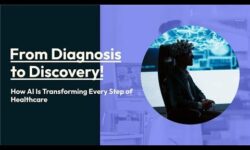
Unveiling the New Era of AI: Agentic Systems, Workforce Disruption, and the Shifting Landscape of Global Governance
- Current State and Dynamics of the Artificial Intelligence Market
- Emerging Innovations and Breakthroughs in AI Technologies
- Key Players, Strategies, and Market Positioning
- Projections and Drivers Shaping AI Market Expansion
- Geographic Trends and Regional Market Highlights
- Anticipated Developments and Strategic Implications
- Barriers, Risks, and New Avenues for Growth in AI
- Sources & References
“Introduction: DJI’s enterprise drone lineup has expanded into a versatile range of Matrice and Mavic Enterprise models, each tailored to specific professional needs.” (source)
Current State and Dynamics of the Artificial Intelligence Market
The artificial intelligence (AI) market in 2025 is characterized by rapid innovation, surging investment, and profound societal impact. The global AI market is projected to reach over $305 billion in revenue by the end of 2025, reflecting a compound annual growth rate (CAGR) of more than 20%. This growth is driven by advancements in agentic AI systems, workforce transformation, and evolving global governance frameworks.
- Agentic Agents: The emergence of agentic AI—autonomous systems capable of planning, reasoning, and executing complex tasks—has accelerated in 2025. These agents, such as OpenAI’s GPT-5 and Google’s Gemini Ultra, are now widely deployed in business process automation, customer service, and creative industries. Their ability to operate with minimal human oversight is reshaping productivity benchmarks and business models (McKinsey).
- Workforce Upheaval: AI-driven automation is causing significant shifts in the global workforce. According to World Economic Forum projections, up to 44% of workers’ core skills are expected to change by 2027, with millions of jobs being redefined or displaced. While AI creates new opportunities in data science, engineering, and oversight roles, it also intensifies the need for large-scale reskilling and social safety nets.
- Global Governance: The proliferation of powerful AI systems has prompted urgent calls for international regulation. In 2025, the EU AI Act set a precedent for risk-based governance, while the United Nations and G7 have initiated frameworks for cross-border AI safety and ethical standards (Reuters). However, regulatory fragmentation and geopolitical competition remain challenges, as countries balance innovation with security and ethical concerns.
In summary, the AI market in mid-2025 is defined by the mainstreaming of agentic agents, disruptive workforce changes, and the ongoing evolution of global governance. These dynamics are shaping not only the technology sector but also the broader economic and social landscape worldwide.
Emerging Innovations and Breakthroughs in AI Technologies
As of July 2025, artificial intelligence (AI) continues to accelerate at an unprecedented pace, with agentic agents, workforce transformation, and global governance emerging as focal points of innovation and debate.
- Agentic Agents: The rise of agentic AI—systems capable of autonomous decision-making and complex task execution—has marked a significant leap in capability. Platforms like Auto-GPT and Microsoft’s Autonomous Agents are now being deployed in enterprise environments, handling everything from supply chain optimization to customer service. According to Gartner, 40% of enterprises are expected to deploy agentic AI by 2026, up from just 12% in 2023.
- Workforce Upheaval: The proliferation of advanced AI agents is reshaping the global workforce. A World Economic Forum report projects that by the end of 2025, AI-driven automation will have displaced 85 million jobs but created 97 million new roles, particularly in AI oversight, prompt engineering, and human-AI collaboration. However, the transition is uneven, with sectors such as finance, logistics, and healthcare experiencing the most disruption.
- Global Governance: The rapid deployment of agentic AI has intensified calls for robust global governance frameworks. The EU AI Act, which came into force in 2024, is now influencing regulatory approaches worldwide, emphasizing transparency, accountability, and risk management. Meanwhile, the OECD AI Principles and the UN AI Advisory Body are working to harmonize standards and address cross-border challenges, including AI safety, bias, and misuse.
In summary, the state of AI in mid-2025 is defined by the mainstreaming of agentic agents, significant workforce shifts, and the emergence of global governance mechanisms. These trends are set to shape the trajectory of AI innovation and its societal impact in the years ahead.
Key Players, Strategies, and Market Positioning
The artificial intelligence (AI) landscape in 2025 is defined by rapid advancements in agentic agents, significant workforce transformation, and intensifying debates over global governance. The market is dominated by a mix of established technology giants, nimble startups, and state-backed entities, each employing distinct strategies to secure their positions in this evolving ecosystem.
-
Key Players:
- Microsoft and OpenAI continue to lead in foundational AI models and agentic systems, leveraging their cloud infrastructure and developer ecosystems.
- Google DeepMind focuses on advanced agentic architectures and integration with enterprise productivity tools.
- Anthropic and Cohere are prominent for their emphasis on AI safety and scalable, customizable agentic solutions for businesses.
- Chinese firms like Baidu and SenseTime are rapidly expanding, supported by state investment and a vast domestic market.
-
Strategies:
- Major players are investing heavily in agentic AI—autonomous systems capable of complex decision-making and task execution. Microsoft’s Copilot and Google’s Gemini agents exemplify this trend (Financial Times).
- Strategic partnerships and acquisitions are accelerating, with companies seeking to integrate AI agents into existing workflows and consumer products.
- AI safety and alignment are central, with Anthropic and OpenAI publishing frameworks for responsible agent deployment (Anthropic News).
-
Market Positioning:
- US firms maintain a technological edge, but Chinese companies are closing the gap, especially in applied AI and government-backed initiatives (Brookings).
- Startups are differentiating through vertical specialization—offering agentic solutions tailored to sectors like healthcare, finance, and logistics.
- Global governance remains fragmented. The OECD AI Principles and the EU’s AI Act are shaping regulatory frameworks, but enforcement and international consensus lag behind technological progress.
As agentic agents proliferate, workforce upheaval is accelerating. According to World Economic Forum projections, up to 40% of global workers will need reskilling by 2030, with 2025 marking a critical inflection point. The interplay between innovation, regulation, and labor adaptation will define the next phase of AI market leadership.
Projections and Drivers Shaping AI Market Expansion
The artificial intelligence (AI) market is undergoing rapid transformation, driven by technological breakthroughs, evolving workforce dynamics, and intensifying global governance debates. As of mid-2025, the global AI market is projected to reach over $300 billion, with compound annual growth rates (CAGR) exceeding 35% through 2030. This expansion is fueled by the proliferation of agentic AI systems, significant shifts in labor markets, and the emergence of new regulatory frameworks.
- Agentic Agents: The rise of agentic AI—autonomous systems capable of complex decision-making and self-directed action—marks a pivotal shift. These agents are increasingly deployed in sectors such as finance, healthcare, and logistics, where they optimize operations and enable new business models. According to McKinsey, over 60% of organizations have adopted some form of agentic AI, with adoption rates expected to climb as capabilities mature.
- Workforce Upheaval: AI-driven automation is reshaping the global workforce. The World Economic Forum estimates that by 2025, 85 million jobs may be displaced by AI, while 97 million new roles could emerge, particularly in AI development, oversight, and maintenance. This transition is prompting urgent calls for reskilling and upskilling, as well as new approaches to social safety nets.
- Global Governance: The acceleration of AI capabilities has intensified international efforts to establish governance frameworks. The European Union’s AI Act, set to take effect in 2025, is the world’s first comprehensive AI regulation, influencing policy discussions in the US, China, and beyond. Meanwhile, the OECD AI Principles and the UN AI Advisory Body are shaping global norms around transparency, accountability, and ethical use.
In summary, the AI market’s trajectory is shaped by the interplay of technological innovation, workforce transformation, and evolving governance. As agentic agents become more prevalent and regulatory clarity increases, the sector is poised for sustained, albeit complex, growth through the end of the decade.
Geographic Trends and Regional Market Highlights
Geographic Trends and Regional Market Highlights: The State of Artificial Intelligence—Agentic Agents, Workforce Upheaval & Global Governance (Updated: 2025, July 6th, 23:59 CET)
As artificial intelligence (AI) continues its rapid evolution, 2025 marks a pivotal year for agentic agents—AI systems capable of autonomous decision-making—and their impact on global markets, labor, and governance. Regional adoption and regulatory responses vary significantly, shaping the competitive landscape and societal outcomes.
- North America: The United States remains a leader in agentic AI development, with Silicon Valley and Boston as innovation hubs. According to McKinsey, over 60% of Fortune 500 companies have integrated agentic agents into core business processes, particularly in finance, logistics, and customer service. However, workforce displacement is accelerating, with the U.S. Bureau of Labor Statistics reporting a 12% decline in administrative roles since 2023 (BLS).
- Europe: The European Union is prioritizing ethical AI and workforce transition. The EU AI Act, enacted in 2024, imposes strict requirements on agentic systems, especially in high-risk sectors. Germany and France lead in industrial AI, while Scandinavia invests heavily in reskilling programs. The European Commission estimates that 8 million workers will require retraining by 2027 (European Commission).
- Asia-Pacific: China is aggressively scaling agentic AI in manufacturing, e-commerce, and public services. The South China Morning Post reports that over 70% of large Chinese enterprises deploy agentic agents, supported by state-led initiatives. Japan and South Korea focus on robotics and healthcare, with government-backed upskilling programs to mitigate workforce disruption.
- Global Governance: The United Nations’ AI Advisory Body released its first global framework in June 2025, calling for cross-border standards and transparency in agentic AI deployment. Adoption is uneven, with the U.S., EU, and China shaping the agenda, while emerging markets face challenges in compliance and capacity-building.
In summary, the state of AI in 2025 is defined by regional leadership in agentic agents, divergent regulatory approaches, and a growing imperative for global governance. Workforce upheaval is a shared concern, with reskilling and social safety nets emerging as critical policy priorities worldwide.
Anticipated Developments and Strategic Implications
As of July 2025, the landscape of artificial intelligence (AI) is defined by rapid advancements in agentic agents, significant workforce transformations, and intensifying debates over global governance. These developments are reshaping industries, labor markets, and international policy frameworks.
- Agentic Agents: The emergence of highly autonomous, goal-driven AI systems—often referred to as agentic agents—has accelerated in 2025. These agents are capable of complex decision-making, self-improvement, and multi-step task execution with minimal human oversight. Major tech firms, including Microsoft and Google DeepMind, have released agentic AI platforms that are being rapidly adopted in sectors such as finance, logistics, and healthcare. According to Gartner, 50% of enterprises are expected to deploy agentic AI by 2027, up from just 10% in 2023.
- Workforce Upheaval: The proliferation of agentic agents is driving profound changes in the workforce. Routine and even some knowledge-based jobs are being automated at an unprecedented pace. The International Labour Organization reports that up to 18% of global jobs are at high risk of automation by 2030, with the most immediate impacts felt in administrative, legal, and customer service roles. However, new opportunities are emerging in AI oversight, prompt engineering, and human-AI collaboration, requiring rapid reskilling and policy adaptation.
- Global Governance: The international community is grappling with the regulatory and ethical challenges posed by agentic AI. The EU AI Act has set a precedent for risk-based regulation, while the OECD and UN AI Advisory Body are pushing for global standards on transparency, accountability, and safety. However, geopolitical tensions and divergent national interests continue to hinder the creation of a unified global governance framework.
Strategically, organizations must invest in AI literacy, robust risk management, and adaptive workforce strategies to remain competitive. Policymakers face mounting pressure to balance innovation with social stability and ethical safeguards, as the trajectory of agentic AI will shape economic and geopolitical realities for years to come.
Barriers, Risks, and New Avenues for Growth in AI
Artificial Intelligence (AI) continues to reshape industries, economies, and societies at an unprecedented pace. As of mid-2025, the field is marked by rapid advancements in agentic agents—AI systems capable of autonomous decision-making and complex task execution. These agents are increasingly deployed in sectors such as finance, healthcare, and logistics, driving efficiency but also introducing new layers of risk and complexity (McKinsey).
- Barriers: Despite progress, significant barriers remain. Data privacy and security concerns are intensifying as agentic agents handle sensitive information. Technical challenges, such as ensuring explainability and robustness, persist, especially as models grow more complex. Regulatory fragmentation across regions further complicates deployment, with the EU’s AI Act and China’s evolving AI regulations setting divergent standards (Euronews).
- Risks: Workforce upheaval is a central risk. According to the World Economic Forum, up to 44% of workers’ skills are expected to be disrupted by AI by 2027, with automation threatening both routine and some skilled jobs. Additionally, agentic agents raise concerns about unintended actions, bias, and the potential for misuse in areas like cybersecurity and misinformation (Brookings).
- New Avenues for Growth: Despite these challenges, AI is opening new growth opportunities. The global AI market is projected to reach $407 billion by 2027, up from $196 billion in 2023 (Statista). Emerging applications include AI-driven drug discovery, personalized education, and climate modeling. The rise of open-source AI models and collaborative governance frameworks, such as the OECD AI Principles, are fostering innovation while aiming to mitigate risks.
Global governance remains a work in progress. Multilateral efforts, including the G7’s Hiroshima AI Process and the United Nations’ AI advisory body, are seeking to harmonize standards and address cross-border risks. However, geopolitical competition and differing national priorities continue to challenge the creation of a unified regulatory landscape (Reuters).
In summary, while agentic agents and AI-driven automation present significant risks and barriers, they also unlock transformative avenues for growth. The coming years will hinge on the ability of stakeholders to balance innovation with robust governance and workforce adaptation.
Sources & References
- The State of Artificial Intelligence: Agentic Agents, Workforce Upheaval & Global Governance / Updated: 2025, July 6th, 23:59 CET
- Statista
- McKinsey
- EU AI Act
- Microsoft
- UN AI Advisory Body
- Google DeepMind
- Anthropic News
- Cohere
- Baidu
- SenseTime
- Financial Times
- Brookings
- European Commission
- South China Morning Post
- International Labour Organization
- Euronews
This post AI Agents, Workforce Transformation & Global Policy: Insights from the Latest Industry Report appeared first on Macho Levante.

A cybersecurity specialist with a passion for blockchain technology, Irene L. Rodriguez focuses on the intersection of privacy, security, and decentralized networks. Her writing empowers readers to navigate the crypto world safely, covering everything from wallet security to protocol vulnerabilities. Irene also consults for several blockchain security firms.







